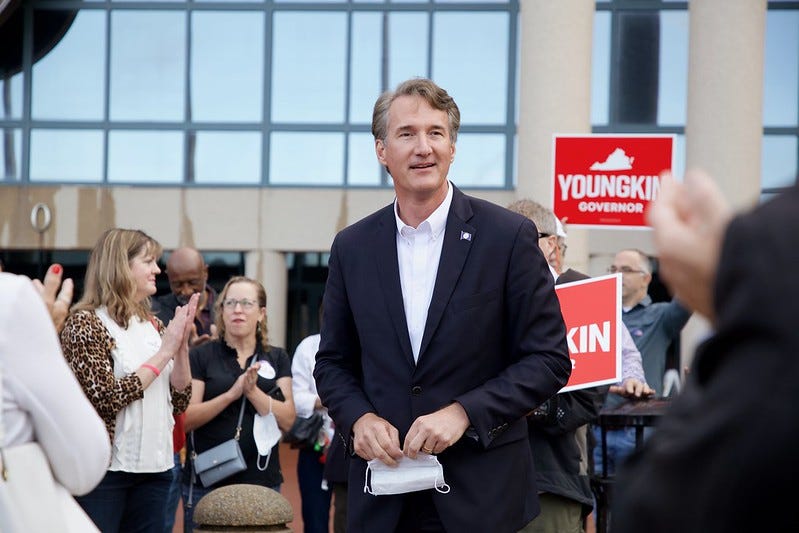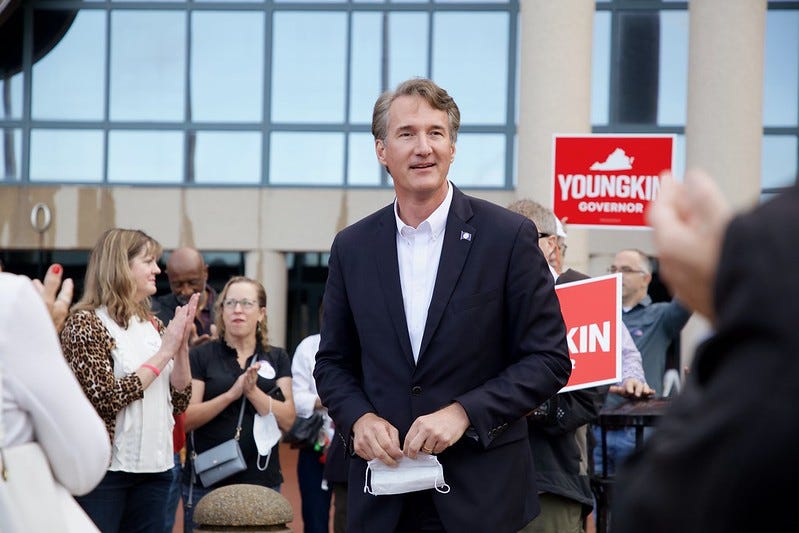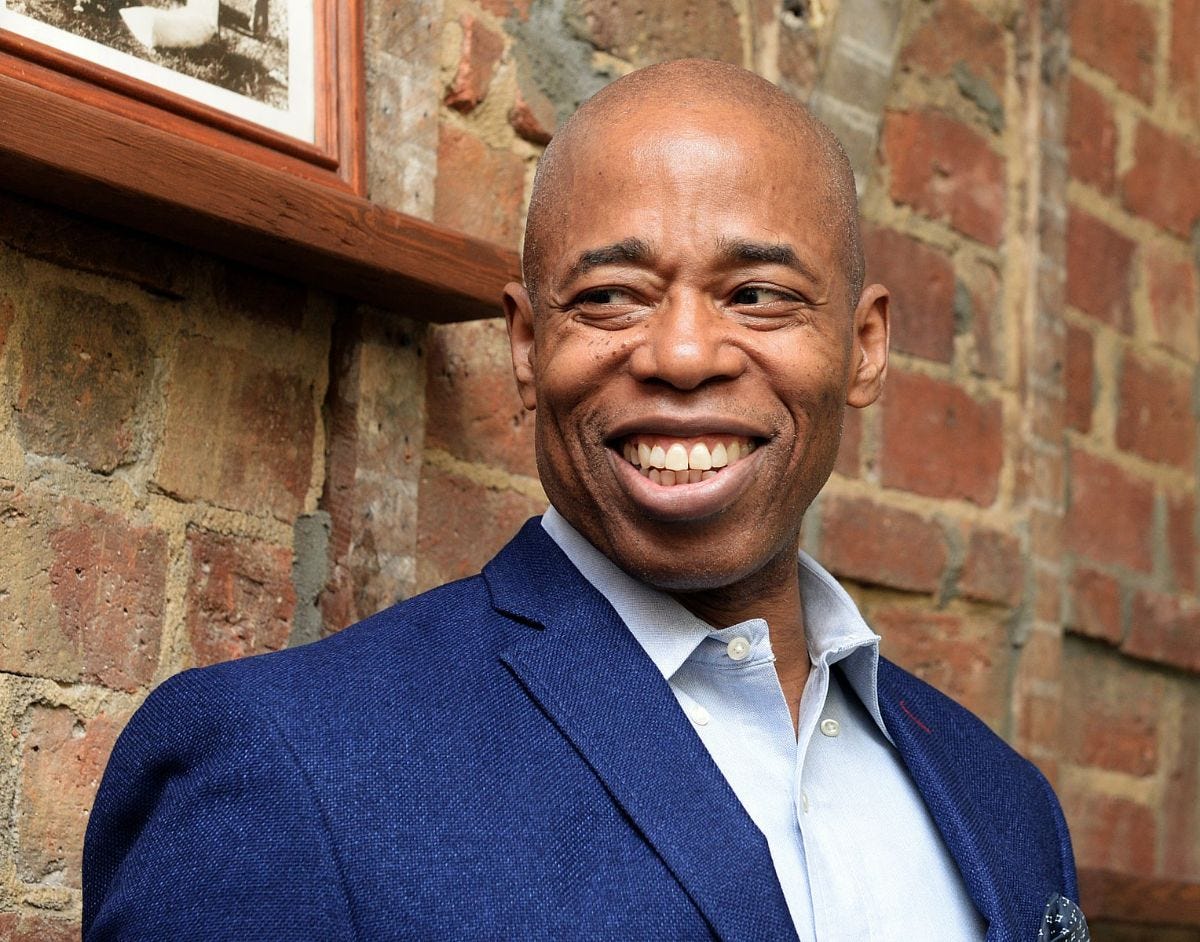Wake Up To Politics - November 3, 2021
Wake Up To Politics: Republicans romp in Virginia
Good morning! It’s Wednesday, November 3, 2021. Election Day 2024 is 1,099 days away. Election Day 2022 is 371 days away.
Republicans romp in Virginia
Democrats were dealt a devastating blow on Tuesday as Republican Glenn Youngkin seized the Virginia governorship, placing a state that had been leaning blue in recent years firmly in GOP hands.
Youngkin, a former private equity executive, defeated Democrat Terry McAuliffe, who previously held the governorship from 2013 to 2017. With approximately 95% of the vote reporting, Youngkin currently has a 2-point lead, 50.7% to 48.6%. He has been declared the victor in the race by the Associated Press and all the major TV networks.
Although winners have not been declared in Virginia’s two other statewide races, Republicans Winsome Sears and Jason Miyares are also leading in the contests for lieutenant governor and attorney general, respectively. The two candidates, who both have advantages of about 1 percentage point, are each history-making: Sears would be the first woman of color to hold statewide office in Virginia, while Miyares would be the first Latino.
In a state that has not elected a Republican statewide since 2009, the likely GOP three-peat comes as a stark reversal and a repudiation of Democratic rule. “Together we will change the trajectory of this commonwealth, and friends, we are going to start that transformation on day one,” Younkgin said in his victory speech early this morning.
Republicans also appear poised to flip control of the Virginia House of Delegates, although some races remain to be called.

Virginia was not the only state to see Democrats struggle on Tuesday: the New Jersey gubernatorial race, which was expected to be an easy cruise to re-election for Democratic Gov. Phil Murphy, is currently too close to call. With 88% of the vote reporting, Murphy currently trails his Republican challenger, former State Assemblyman Jack Ciattarelli, 49.6% to 49.65%.
Several Democratic-leaning counties have yet to finish reporting in New Jersey, which may provide enough of the vote for Murphy to win, but even a slim victory in the Garden State would be yet another unsettling result for Democrats. President Joe Biden won New Jersey by 16 percentage points in 2020, and Virginia by 10.
Younkgin’s victory in Virginia seems to have been fueled by a recapturing of the suburban voters who rejected the GOP during the Trump era. Although McAuliffe sought to tie Youngkin to Trump throughout the campaign, Youngkin kept the former president at arm’s length, offering a useful playbook to Republican candidates in the 2022 midterms.
The first-time candidate also stuck to a message that appears to have resonated in Virginia, promising to ban the teaching of critical race theory in the state’s public schools. (The academic construct, which focuses on the argument that racism is systemic in U.S. institutions, is not currently part of the Virginia K-12 curriculum.)
McAuliffe, who called Youngkin’s focus on the issue a “racist dog whistle,” nevertheless handed the Republican a ready-made attack line when he said in a debate, “I don’t think parents should be telling schools what they should teach.” In his victory remarks, Youngkin told supporters, “We’re going to embrace our parents, not ignore them”; with an eye on their 2022 strategy, other Republicans are already discussing ways to frame the GOP as “the party of parents.”

The results in Virginia and New Jersey underline the dangers facing Democrats as the midterms near. The party in the White House generally suffers in the first midterms of a new president’s tenure (as well as in the Virginia gubernatorial race), and Tuesday’s results do not bode well for Democratic hopes of bucking that trend.
For Democrats, their loss in Virginia and near-loss in New Jersey are fresh reminders of a treacherous national environment, with Biden’s approval ratings sinking, inflation rising, and his economic agenda stalling.
Virginia Democrats repeatedly urged their counterparts in Washington to pass Biden’s bipartisan infrastructure bill and social spending package before the gubernatorial race; both pieces of legislation remain in limbo amid intraparty squabbles.
Although every major news outlet has declared the race for Youngkin, McAuliffe has yet to admit defeat. “We know that the long term path of Virginia is toward inclusion and openness and tolerance,” the longtime Democratic luminary said in a statement that did not feature a concession. “We can and will never stop fighting for those values that we believe in.”
More election results to know
Virginia and New Jersey weren’t the only states to hold elections on Tuesday. Here’s a roundup of some other noteworthy results:
Local races
Democrat Eric Adams was elected mayor of New York City. Adams, a centrist former police captain, is the second Black mayor of the city.
It appears that Byron Brown in Buffalo has won a write-in campaign for a fifth term as mayor. He defeated democratic socialist India Walton after she scored a surprising win against him in the Democratic primary earlier this year.
Democrat Michelle Wu was elected mayor of Boston. She is the first non-white-man mayor in the city’s 400-year history.
Republicans flipped a trio of local offices in Long Island, a show of Democratic weakness in the suburbs.
The mayoral election in Atlanta is headed for a runoff between two Democratic contenders.
Republican John Lujan flipped a state House seat in San Antonio, another sign of the GOP making inroads among Latinos in a historically Democratic area
Democrat Aftab Pureval was elected mayor of Cincinnati. He is the city’s first Asian-American mayor.
Democrat Ed Gainey is the new mayor of Pittsburgh. He is the first Black mayor of the city.
Special elections
In Ohio, Democrat Shontel Brown and Republican Mike Carey each easily won a pair of House special elections in reliable territory for their parties. When they join Congress, the House makeup will be 221 Democrats and 213 Republicans.
In Florida, the Democratic primary in the special election to fill the House seat of the late Rep. Alcee Hastings (D) is headed to a recount. With 100% of precincts reporting, the top two candidates are separated by just 31 votes.
Ballot issues
In Minneapolis, voters rejected a ballot measure that would have replaced the city’s police department with a Department of Public Safety. The measure had been drafted after the national uproar sparked by the killing of George Floyd by one of the city’s police officers last year.
Two more items for your radar
— Vaccines for kids: “Pediatricians are preparing to administer the nation’s first coronavirus children’s vaccine as early as Wednesday after the Centers for Disease Control and Prevention signed off Tuesday night on giving the Pfizer-BioNTech shots to millions of kids ages 5 to 11,” the Washington Post reports.
“The go-ahead from CDC Director Rochelle Walensky is a watershed moment in the fight against the pandemic, which has killed 745,000 people in the United States and sickened nearly 2 million kids.”

— Democratic spending package: “Democrats reached an agreement on provisions designed to lower the price of some prescription drugs, appearing to resolve one of the final issues in the party’s negotiations over their $1.85 trillion healthcare, education and climate-change bill,” the Wall Street Journal reports.
“The agreement, which is backed by the White House, would empower Medicare to negotiate the price of some drugs, penalize drug companies for raising prices faster than the rate of inflation and cap out-of-pocket costs for seniors at $2,000 annually. It also creates a $35 out-of-pocket monthly maximum for insulin, Democrats said.”
Policy Roundup: Global
By Wake Up To Politics global contributor Miles Hession.
President Biden made moves to recover relationships with France and Turkey, reaffirm his desire for Iran talks, and agreed to an international corporate tax proposal at the G-20 summit. Biden met with French President Emmanuel Macron at the outset of the summit to apologize for the U.S.’ “clumsy” handling of a failed submarine contract between France and Australia. While Australia balked at the concession, and Macron took a swipe at Australian Prime Minister Scott Morrison, Biden appeared to have mended diplomatic ties with France.
Biden also assuaged tensions with Turkish President Recep Tayyip Erdogan that surfaced last week after Erdogan threatened to no longer recognize the U.S. envoy in Turkey, mending that relationship while discussing human rights and a sale of F-16 fighter jets to Turkey. Later in the summit, Biden reaffirmed his commitment to nuclear talks with Iran and joined an agreement for a minimum corporate tax rate that would remove the incentives for major companies from moving their headquarters offshore to reap lower tax liabilities.
Japanese Prime Minister Fumio Kishida won a comfortable margin in the recent general election, bolstering an initially lackluster premiership. Boosted by elderly voters and apathy among young people, voters came out for Kishida’s Liberal Democratic Party (LDP) which has had almost uninterrupted governmental control since World War II. While there were pre-election murmurs of an upset, especially considering Kishida’s lagging approval ratings and dissatisfaction with former Prime Minister Shinzo Abe’s handling of the pandemic, they failed to manifest.
LDP’s comfortable margin will likely provide Kishida with a mandate, especially for his more controversial policy positions like his opposition to married couples having separate surnames or to same-sex marriage. The strength of this mandate will be put to test right away as Kishida is now tasked with drafting climate proposals for the world’s third largest economy at the global COP26 climate summit.
Macron has delayed threatened sanctions on the UK over a fishing dispute as the EU stepped in to mediate. Tensions rose after France detained a British fisher and issued fines in retaliation to a lack of fishing licenses issued by the UK for French fishers. The issuing of these licenses was a major facet of post-Brexit trade agreements between the UK and EU, and Macron expressed frustration with the British not complying.
British Prime Minister Boris Johnson met with Macron during the G-20 summit last weekend, but Macron maintained a hardline stance threatening sanctions and increased import checks should new licenses not be issued. With both sides accusing the other of playing politics, the EU stepped in for emergency talks to de-escalate tensions and find an agreement, an early sign of many post-Brexit disputes that have yet to emerge.
More global headlines, via Miles:
The EU has begun fining Poland a million euros a day until it complies with the primacy of European law.
Israel has approved plans to build further settlements in Palestine despite outcry from many European countries and the U.S.
Many ambitious plans, like those pertaining to ending deforestation and cutting methane emissions, have already emerged out of the COP26 summit. Until an enforcement mechanism is agreed upon, though, it is unclear how much concrete policy change will emerge from the summit.
Daybook
All times Eastern.
WHITE HOUSE
President Joe Biden and Vice President Kamala Harris will receive their daily intelligence briefing at 1 p.m. Neither has any other events on their public schedules.
U.S. public health officials will hold a press briefing at 1:45 p.m. to provide an update on the COVID-19 response.
CONGRESS The Senate will convene at 10 a.m. and hold debate over the nomination of Robert Luis Santos to be Director of the U.S. Census Bureau. At around 11 a.m., the chamber will hold votes to confirm Benjamin Harris as Assistant Secretary of the Treasury for Economic Policy and Isobel Coleman as Deputy Administrator of the U.S. Agency for International Development (USAID) for Policy and Programming.
At around 2:15 p.m., the Senate will hold a procedural vote to begin debate on S.4, the John R. Lewis Voting Rights Advancement Act of 2021. The measure would restore Section 5 of the Voting Rights Act of 1965, a provision which required certain states to obtain federal “preclearance” before making changes to their voting laws until it was struck down by the Supreme Court in 2013.
The version of S.4 that the Senate will vote on is a compromise measure unveiled on Tuesday by senators including Joe Manchin (D-WV) and Lisa Murkowski (R-AK). The measure will need 10 Republican backers to advance in today’s vote; no other GOP senators besides Murkowksi have signaled plans to support the bill.
If the cloture vote on S.4 fails, as is expected, the Senate is slated to hold two more votes at 5:15 p.m., on confirming Jeffrey Prieto to be General Counsel of the Environmental Protection Agency and Rajesh Nayak to be Assistant Secretary of Labor for Policy.
The House will convene at 12 p.m. The chamber is scheduled to vote on 11 pieces of legislation under “suspension of the rules”:
H.Con.Res. 44, the Fiscal State of the Nation Resolution
H.R. 1917, the Hazard Eligibility and Local Projects Act
H.R. 1339, the Advanced Air Mobility Coordination and Leadership Act
H.R. 3193, the E-BRIDGE Act
H.R. 3709, the Preliminary Damage Assessment Improvement Act of 2021
H.R. 2220, to amend title 40, United States Code, to modify the treatment of certain bargain-price options to purchase at less than fair market value
H.R. 390, to redesignate the Federal Building located at 167 North Main Street in Memphis, Tennessee as the “Odell Horton Federal Building”
H.R. 4679, to designate the Federal building located at 1200 New Jersey Avenue Southeast in Washington, DC, as the “Norman Yoshio Mineta Federal Building”
H.R. 4660, to designate the Federal building and United States Courthouse located at 1125 Chapline Street in Wheeling, West Virginia, as the “Frederick P. Stamp, Jr. Federal Building and United States Courthouse”
S. 1064, the RENACER Act
H.Res. 760, expressing solidarity with Cuban citizens demonstrating peacefully for fundamental freedoms, condemning the Cuban regime's acts of repression, and calling for the immediate release of arbitrarily detained Cuban citizensFollowing those votes, the House may also vote on H.R. 3992, the Protect Older Job Applicants Act of 2021.
CONGRESSIONAL COMMITTEES The Senate Commerce, Science, and Transportation will hold a hearing at 10 a.m. on aviation safety reform. Federal Aviation Administration (FAA) Administrator Steve Dickson will testify.
The House Intelligence Committee will hold a hearing at 9:30 a.m. on countering domestic terrorism. The panel will hear testimony from John Cohen and Timothy Langan, the top counterterrorism officials at the Department of Homeland Security and the FBI, respectively.
The House Homeland Security Committee will hold a hearing at 10 a.m. on the U.S. approach to cybersecurity and “raising the bar today to meet the threats of tomorrow.” National Cyber Director Chris Inglis and Cybersecurity and Infrastructure Security Agency (CISA) Director Jen Easterly will each give their first testimony before the committee.
COURTS The Supreme Court will hear oral arguments at 10 a.m. in New York State Rifle and Pistol Association v. Bruen.
“In the most important gun rights case in over a decade, the justices will consider the scope of one of the Constitution’s most hotly contested provisions: the Second Amendment,” Wake Up To Politics legal contributor Anna Salvatore writes in.
“The Court ruled in 2008 that Americans have the right to keep guns in their home for self-defense; the question today is whether that right extends outside the home as well. Given that the Court has a new six-justice conservative majority, it is widely expected to rule in favor of gun-owners.”






